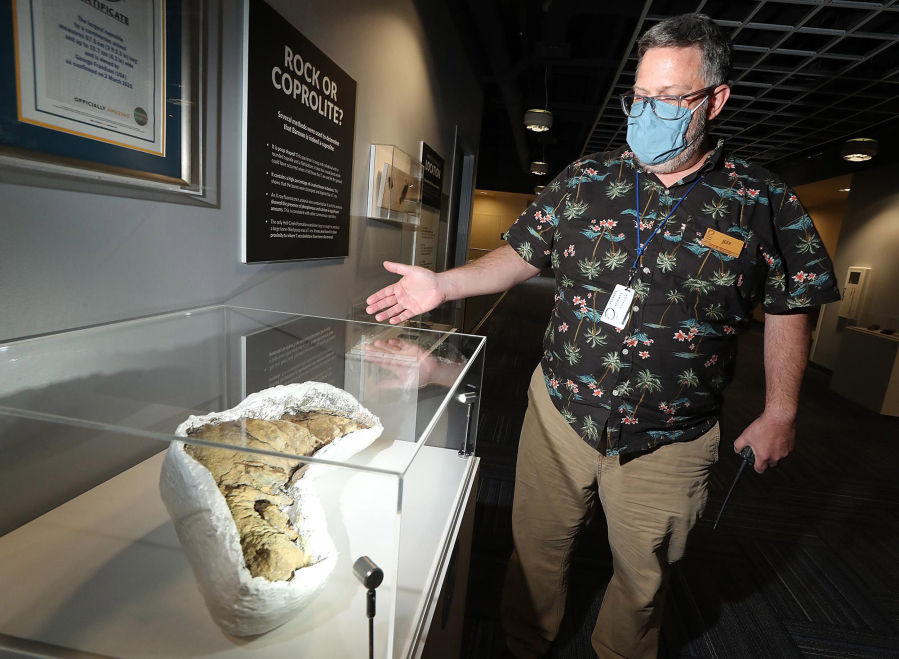ORLANDO, Florida — At more than 26 inches long and 20-plus pounds, Barnum is the world record holder for the largest recorded pieces of feces ever made by a carnivore, laid by a Tyrannosaurus rex as much as 70 million years ago.
Named for the paleontologist who discovered the T. rex, Barnum Brown, the piece of coprolite — as fossilized poop is called — is on display at the Orlando Science Center with more specimens from the Poozeum, the world’s largest collection of coprolite, owned by George Frandsen of Jacksonville, Florida.
To share with museums, Frandsen, 42, had to get the pieces in his collection insured. He says that when he first started asking insurance companies to give him a policy on Barnum, “They’d just start laughing.”
That’s unsurprising to Roger Maharaj, senior underwriter for Burns & Wilcox in Tampa. “There are only a handful of companies probably in the United States that would go after that,” he said.
Maharaj works in what is known as Florida’s surplus lines of insurance. Most things that get insured fall into what is known as the admitted market, meaning that the policies must conform to state regulations and are backed by state law.
In the surplus lines, rules can be a little looser. Not all state regulations have to apply to surplus policies. If that sounds riskier, it is, but it allows companies to cover potential losses other companies don’t want to take on.
Surplus lines don’t only cover the bizarre world of ancient doo doo.
They cover everything from motorized surfboards to amphibious cars to kidnapping ransoms. Metro Orlando alone has more than $6,000 in kidnapping premiums.
Sometimes it’s for common but overlooked things one sees every day, such as solar panels.
“A lot of companies don’t want to insure them because they can get damaged in storms or fly off of roofs,” Maharaj said.
Another kind of policy found in the surplus lines is prize indemnification, also known as a hole-in-one policy. These cover contest prizes for amazing feats, such as the time a Central Florida fisher caught a 101-pound bass and won $100,000.
“Typically, these policies don’t cost a lot of money,” Maharaj said. “So the only way a company can come out ahead is if the possibility that someone is going to make it is so low that … you can not worry about having to pay out the claim.”
It’s similar to calculating the odds on casino games.
Maharaj says a recent thing he’s been writing policies for is drones.
“They can create a problem if it goes beyond a certain limit and it interferes with airplane aviation,” he said. “Drone filming is interesting because it presents a lot of issues regarding privacy and things.”
Professional liabilities also tend to fall into the surplus lines. You can even get your butler insured, but it’s not to replace them.
“If they’re only working for one person, the person [who hired them] should get the policy,” Maharaj said. “Because if they’re doing anything in my name, I would be protected in case they make a mistake.”
But what kind of damage can even befall an eons-old piece of poop?
“They’re extremely fragile,” Frandsen said. “Fire, flood, theft. It’s a funny object, but it’s also a rare object, so people want it.”
Storage conditions and how it will be transported all have to be taken into account.
And then of course there is a determination of value. “We’d have to check with museums, even other countries on what the going rate for something like that is,” Maharaj said.
Frandsen says factors that influence value are size and appearance. “When you put it on your desk or mantle, does it look like a poop?” he said. “That really helps the price.”
Barnum eventually got a policy for $15,000, for which he pays a premium of about $300 a year.
Frandsen continues to expand the coprolite collection he’s been building since he was 18.
“Bones are neat but they don’t tell a story, where a turd does,” he said.



